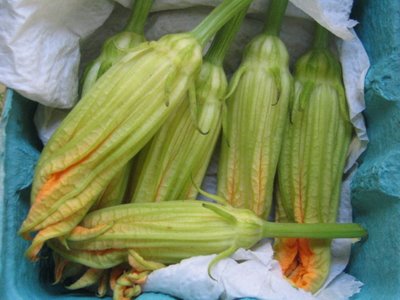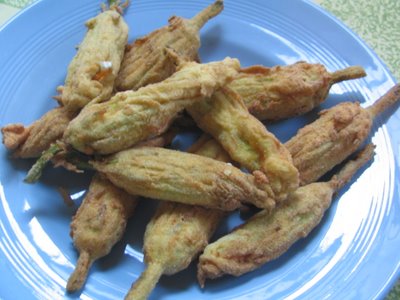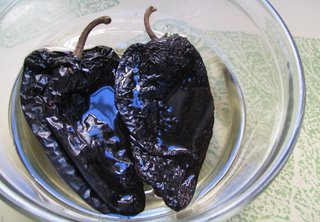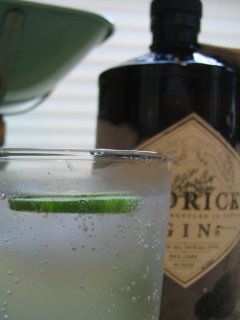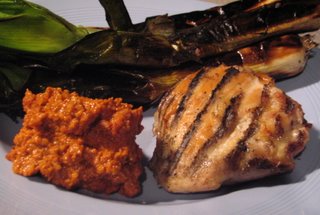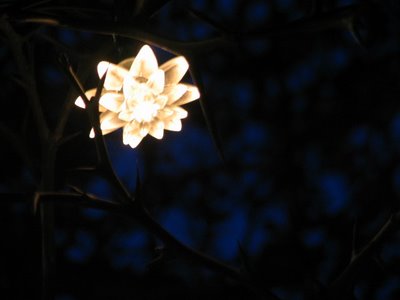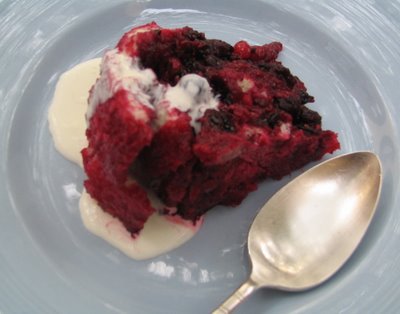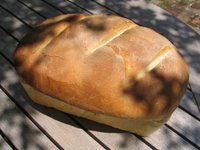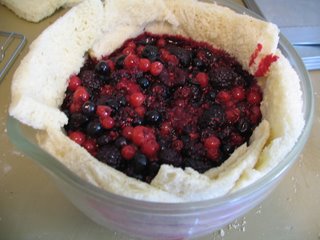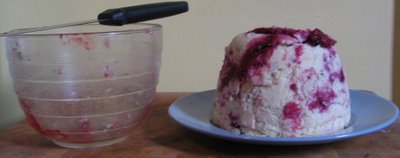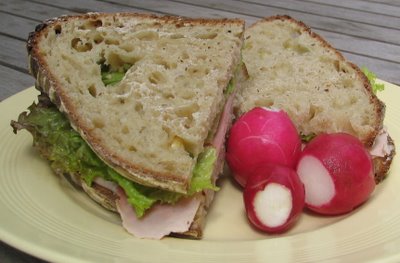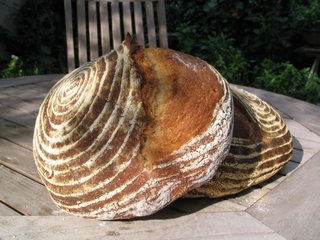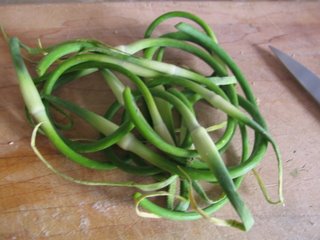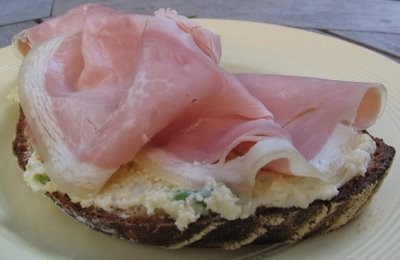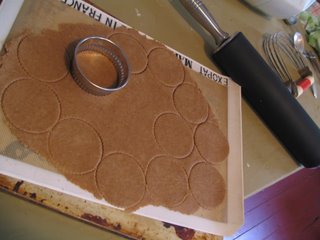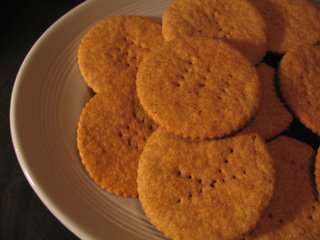A Pot of Basil
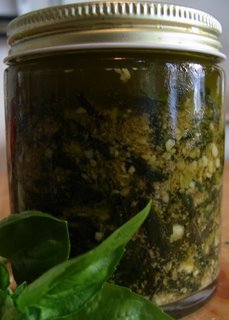 When someone gives you a big bag of basil, you are honour bound to make pesto. And even if honour has no sway over you (I confess that I am, more often than not, cloth-eared to its calls), the fragrance of the plucked basil will imperiously demand it anyway. The task is weighty, because if you are going to make pesto, you need to make it right. You are not imitating the thick sludge that you can buy in overpriced food stores. No. You are aiming for an ambrosial sauce – “oh for a beaker of the warm south!” No half measures, no cutting of corners. I tried that once and I will here share the story of my foolishness in the hope that it might hop up and down, flapping its wings, warning you from venturing down that path.
When someone gives you a big bag of basil, you are honour bound to make pesto. And even if honour has no sway over you (I confess that I am, more often than not, cloth-eared to its calls), the fragrance of the plucked basil will imperiously demand it anyway. The task is weighty, because if you are going to make pesto, you need to make it right. You are not imitating the thick sludge that you can buy in overpriced food stores. No. You are aiming for an ambrosial sauce – “oh for a beaker of the warm south!” No half measures, no cutting of corners. I tried that once and I will here share the story of my foolishness in the hope that it might hop up and down, flapping its wings, warning you from venturing down that path.When I was living in Ohio I made a friend named George. Ohio provided one of the many small-college settings for scenes of my Uncertain Future, and it required an adventurous spirit if one wished to winkle out gustatory goodness. Food shopping had to be done at huge supermarkets that smelled of stale bleach (not a contradiction, it turns out) and were called Giant Eagles. They scared me. My food friendship with George was formed over the formica counter of that existence, and someone should have given us A for effort. Left alone for a week or so – our partners had both and separately taken off for forgotten reasons – the friendship blossomed into a full-blown folie à deux. Strapped into his bronze Toyota, a car that felt as flimsy as a tin pie pan, we hurtled across the wheat fields in search of edibles. George had, I should mention, only learned to drive a few weeks before, which added considerable novelty and thrill to the ride. And we found all sorts of good things.
We found ice-cream shacks sporting their original 1950s décor. In the summer evenings, couples drove up in their prized vintage open-top cars that had sat in garages all winter long, meticulously restored and waiting for these outings. We found Polish sausages – thick, juicy sausages that could slay your average hot-dog in a trice. There was the Middle Eastern restaurant that introduced me to fattoush, and spurred the first of my many pashes on bread salads. And one town over, a town that closed its last steel mill while we were there, I first tasted the delights of Puerto Rican cooking. Rushing to corner stores before they closed at 6pm, we’d get early dinners of salty, meaty, fried deliciousness that made me curl my toes with pleasure.
But our biggest coup, without a doubt, was the discovery of the dented can emporium. As I write it now, I can hardly believe that this place existed. Maybe it was a fourth dimension, a worm hole into one of Ohio’s other galaxies. It was in a low-rise, stand-alone windowless building that looked more like a meth lab than a grocery store. A battered yellow plastic sign waved you into the parking lot and you entered round back. The first time we went there the electricity was out and we had to wander through the dim maze of aisles led only by our fierce taste for bounty. There were dented cans aplenty. Rows and pyramids and stacks of them. At some point it dawned on us both that these creased and dimpled cans were pretty much exclusively cans of shellfish and “shellfish product.” This realisation merely added salt to our stew and we cackled over our good fortune, cavorting midst the botulism. We finally arrived at the treasure we knew we’d find: shelves of imported Italian tomatoes canned with basil leaves. Nothing of this caliber could be found at the loathed Big Bird supermarkets. We picked out the least compromised tins and piled them into our cart. As the odd gentleman who seemed to own the place was doing the sums with a stubby pencil on a notepad illuminated by a flashlight, he offered us a frequent buyer card and a raffle ticket for a Grand Prize Food Basket. George insisted on being led to inspect the Grand Prize Food Basket, and pointing the flashlight down through the many mummifying layers of budget plastic wrap, we observed that it was comprised solely of soda crackers and something called “Smooth Move” tea: a senna leaf preparation for the relief of occasional constipation. Now positively maniac with the glory of the trove, George and I agreed that our odyssey to the dented can store was, in fact, the ultimate definition of a Smooth Move.
But the scrape of note – the scrape that must stand as a warning to all prospective pesto-makers – came about when George turned up on my doorstep with a bushel of basil. I had never seen a bushel of basil before. Nor, it turned out, had George when he called to order “some basil” from a local farmer. A bushel had sounded a suitable unit – rustic, alliterative - so he’d agreed to it. Let me explain, young grasshopper, so that when you are offered a bushel of basil, you will know what awaits you. A US bushel is a little more than 9 US gallons. An Imperial bushel is 8 Imperial gallons. I am not clear on whether our bushel was of the Imperial or US orientation, but I do know that when I answered my doorbell that day, I could see not much of George, just a lot of basil. “Pesto!” he declared from behind the portable forest.

Soon my kitchen was like the eye of a basil storm. Neither George nor I was at the stage of life in which we owned the right equipment for anything. We also didn’t have key reference texts, or an internet connection. What we had was bags of get up and go. Before long, my cranky blender was chewing up pine nuts and basil leaves, and bowls of hacked up foliage were littering the kitchen. One bushel of herb is a lot for one yard-sale blender, and we resorted to operating the machine with its lid off, jabbing a wooden spoon into the fray whenever we felt brave. The riskiness of this endeavour took all of our concentration, which may be why we didn’t notice that our many bowls of churned basil were turning black and malevolent – entirely ruined.
Basil is a noble herb. Many different cultures revere it. Some varieties are known as “Holy Basil” and are planted outside Hindu temples. The ancient Greeks believed it was the king’s plant, that only the king himself should harvest the leaves, and only with the use of a golden sickle. Perhaps this mandate was made in forethought of blender-armed philistines such as George and me. Golden moon-blades may be fine, but basil leaves and blades are otherwise not a happy combination. Not even the blades of the swish food processor I now own. Cutting the leaves cauterizes the veins, inhibiting the release of their flavour and any machine will produce some heat, which oxidizes and dulls the aromatic oils. The name “pesto” comes from the Italian word pestare meaning to pound or bruise, and we should learn the lesson of the etymology. The bold, sweet fragrance of basil is best released through the poundings of a mortar and pestle.
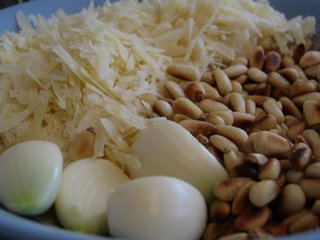 The first pesto I made with a mortar and pestle, following the recipe for Genovese pesto in Clifford A. Wright’s remarkable tome, A Mediterranean Feast, was entirely different from any pesto I had made before - harsh tasting mashes, stiff with too much cheese and nuts, and burning with too much garlic. Following Wright’s measured, philosophical recipe made me understand pesto as a sauce; liquid and leafy. The bruised basil is suspended in oil, happy to give up its essence. The pounding it requires is muscular, but the rest of the preparation is calm, and begins with a cleansing and drying that feels like a ritual. The basil must be washed and then thoroughly dried - laid out on kitchen towels until not even the suspicion of damp adheres to them. The olive oil must be the best, cold-press virgin oil and the freshest you can find. Do not be tempted to supplement the seemingly scant quantities of garlic, pine nuts and cheese in his recipe - these should be mild companion flavours in the sauce. When the ingredients join together in your large mortar, use the pestle to push them closer together, pressing against the sides of the bowl. A firm, gentle push and a slight turning motion. Once they begin to blend into a paste, then you start to pound. The result is one of those benevolent dwellers of the fridge - a jar of lively green sauce that can be stored for many months so long as you replenish the film of olive oil on its surface.
The first pesto I made with a mortar and pestle, following the recipe for Genovese pesto in Clifford A. Wright’s remarkable tome, A Mediterranean Feast, was entirely different from any pesto I had made before - harsh tasting mashes, stiff with too much cheese and nuts, and burning with too much garlic. Following Wright’s measured, philosophical recipe made me understand pesto as a sauce; liquid and leafy. The bruised basil is suspended in oil, happy to give up its essence. The pounding it requires is muscular, but the rest of the preparation is calm, and begins with a cleansing and drying that feels like a ritual. The basil must be washed and then thoroughly dried - laid out on kitchen towels until not even the suspicion of damp adheres to them. The olive oil must be the best, cold-press virgin oil and the freshest you can find. Do not be tempted to supplement the seemingly scant quantities of garlic, pine nuts and cheese in his recipe - these should be mild companion flavours in the sauce. When the ingredients join together in your large mortar, use the pestle to push them closer together, pressing against the sides of the bowl. A firm, gentle push and a slight turning motion. Once they begin to blend into a paste, then you start to pound. The result is one of those benevolent dwellers of the fridge - a jar of lively green sauce that can be stored for many months so long as you replenish the film of olive oil on its surface.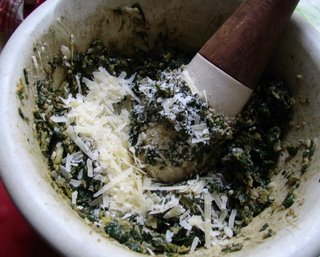 Now we grow basil in our small city garden. Ours is a container garden and we could not help ourselves: we felt compelled to re-create the grisly remnant in Boccacio’s tale of love and decapitation. The Decameron tale recounts how three brothers, puffed with wealth and cruelty, kill and bury their sister’s lover, Lorenzo. Lorenzo’s corpse appears to the bereft Lisabetta in a dream, giving her careful directions to his grave. In Keats' retelling of the story, Lorenzo describes the spot as crowded by fruit and vegetables – more like a salad bowl than a tomb. Lisabetta (Keats calls her ‘Isabella’) digs up his head, wraps it in some fancy cloth and replants it in a posh flowerpot. She then, according to Boccacio, “planted several sprigs of the finest Salernitan basil, and never watered them except with essence of roses or orange-blossom, or with her own teardrops.” The rotten brothers steal even the pampered pot of basil and Lisabetta dies from grief redoubled. No pesto for her. In Keats' poem, he carefully notes that the brothers took their revenge on Lorenzo with “duller steel than the Persèan sword.” So perhaps in memory of the great basil massacre with George and the Persèan blender, perhaps because there can surely be nothing better than a mouldering head to produce a feisty crop of sweet basil (Salome, an epicurean lass, also hid John the Baptist's head in basil), we knew what we had to do when we saw a pile of ceramic dolls' heads and limbs for sale at a flea market. Before planting our basil this year, we tucked a blandly smiling, apple cheeked head deep into the pot, and lo! It did the trick – our basil plants have never been lusher. The head came with two slender ceramic hands – the seller was quite formidable about only selling complete sets, as if she feared seamstresses who might make differently abled dollies – so I arranged them sticking out of the top of the soil, to give pause to any golden-sickeled or fraternally vengeful thieves.
Now we grow basil in our small city garden. Ours is a container garden and we could not help ourselves: we felt compelled to re-create the grisly remnant in Boccacio’s tale of love and decapitation. The Decameron tale recounts how three brothers, puffed with wealth and cruelty, kill and bury their sister’s lover, Lorenzo. Lorenzo’s corpse appears to the bereft Lisabetta in a dream, giving her careful directions to his grave. In Keats' retelling of the story, Lorenzo describes the spot as crowded by fruit and vegetables – more like a salad bowl than a tomb. Lisabetta (Keats calls her ‘Isabella’) digs up his head, wraps it in some fancy cloth and replants it in a posh flowerpot. She then, according to Boccacio, “planted several sprigs of the finest Salernitan basil, and never watered them except with essence of roses or orange-blossom, or with her own teardrops.” The rotten brothers steal even the pampered pot of basil and Lisabetta dies from grief redoubled. No pesto for her. In Keats' poem, he carefully notes that the brothers took their revenge on Lorenzo with “duller steel than the Persèan sword.” So perhaps in memory of the great basil massacre with George and the Persèan blender, perhaps because there can surely be nothing better than a mouldering head to produce a feisty crop of sweet basil (Salome, an epicurean lass, also hid John the Baptist's head in basil), we knew what we had to do when we saw a pile of ceramic dolls' heads and limbs for sale at a flea market. Before planting our basil this year, we tucked a blandly smiling, apple cheeked head deep into the pot, and lo! It did the trick – our basil plants have never been lusher. The head came with two slender ceramic hands – the seller was quite formidable about only selling complete sets, as if she feared seamstresses who might make differently abled dollies – so I arranged them sticking out of the top of the soil, to give pause to any golden-sickeled or fraternally vengeful thieves.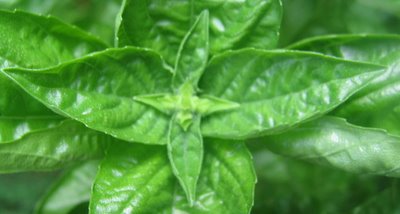
SYLLABUS:PESTO ALLA GENOVESE
adapted from Clifford A. Wright
1 bunch fresh basil (80 medium sized leaves), washed and thoroughly dried. I actually weighed 80 leaves, since I was making more than one batch; by my mathematics, 80 medium sized basil leaves weigh about 1.5 ounces.
2 garlic cloves, peeled
Pinch of salt
2 tablespoons pine nuts, toasted
3 tablespoons freshly grated Parmigiano-Reggiano cheese
3 tablespoons freshly grated pecorino cheese
1 cup extra virgin olive oil.
Pound the basil, garlic, salt and pine nuts together in the mortar until they are a paste. Slowly add the cheeses, about a tablespoon at a time, keeping on pounding. Once you have a paste, scrape it into a bowl and begin slowly adding the olive oil, stirring constantly. It will seem to you that you have too much olive oil – it will not resemble the thick stuff you buy in the supermarkets at all. But that olive oil carries the flavor and also preserves it. Wright says you can keep this pesto in the fridge up to six months, as long as you keep topping up the oil.
